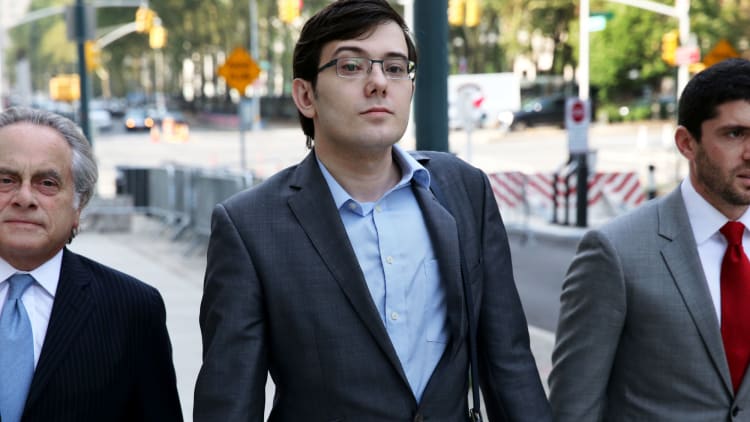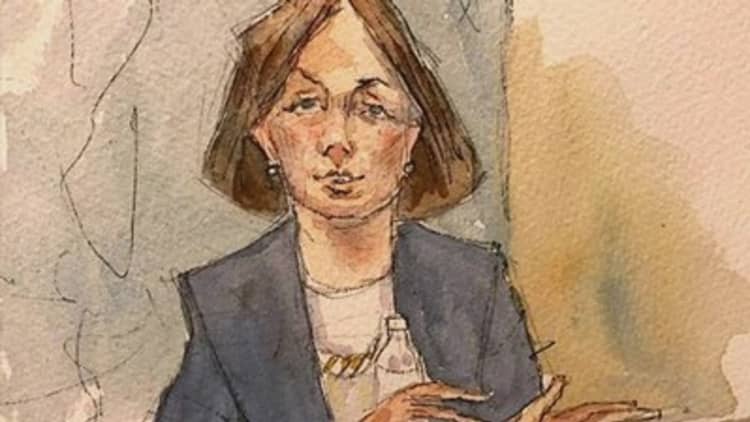
A prosecutor urged jurors Friday to convict "Pharma bro" Martin Shkreli and finally end his years of allegedly lying and stealing from investors while promoting the "myth" that he was an altruistic drug developer.
"Use your common sense, and don't be distracted," said assistant U.S. Attorney Jacquelyn Kasulis.
"It's time for Martin Shkreli to be held accountable... for his choices to lie and take someone else's money without a second thought."
"The last few weeks have shown Martin Shkreli for who is really is: A con man who stole millions of dollars and it's up to you... to tell the defendant, 'It's over, it's done. No more,' '" the prosecutor said.
Kasulis' summation was the last word that jurors heard from defense lawyers and prosecutors in the case in Brooklyn, New York, federal court, where Shkreli is on trial for charges of securities fraud and conspiracy.
Jurors were expected to begin deliberations in the case later Friday.
Shkreli is accused of defrauding investors out of millions of dollars that they placed into his two hedge funds, and then ripping off the publicly traded drug company he had founded, Retrophin, to pay those investors back for their swindled cash.
Prosecutors said Shkreli looted stock shares and cash from Retrophin, and had the firm pay investors through sham consulting agreements, to stop them from hounding him over the course of months or even years for their money.
Shkreli's attorney, Benjamin Brafman, in his own closing argument, noted that every investor who testified in the case ended up getting more money back — often much more money back — than they originally had put into the hedge funds.
Kasulis scoffed at Brafman's implication that Shkreli committed no fraud because people ultimately profited from their dealings with him. She also said Brafman was trying to lead jurors "astray" by mischaracterizing the evidence against Shkreli.
"I would submit to you that the evidence in this case is devastating, and Mr. Brafman has to make up evidence or skew facts," Kasulis said.
"Don't be fooled. There is an avalanche of evidence in this case, and I don't use that word lightly. There's an avalanche that buries the defendant."
Kasulis said that evidence shows in Shkreli's dealings with investors "he lied over and over again to get their money, and to keep their money."
She said he had lied about his past record of stock trading, about the performance of his hedge fund funds, and about the amount of the assets they managed.
"It doesn't matter if you pay people back years later after you've stolen their money," Kasulis said. "Those people are still victims of fraud."
"He then stole from Retrophin and its investors to pay back those defrauded MSMB investors," the prosecutor said. "Think about it... if you rob a bank, and then you rob another bank, you still robbed that first bank."
Kasulis accused the defense of promoting "the Myth of Martin Shkreli."
"Let's talk about who is Martin Shkreli," Kasulis said. "Martin Shkreli is calculating ... we have proven his intent to deceive beyond any doubt."
Kasulis said Shkreli never cured a rare disease that Brafman referred to in his summation, and that the drugs sold by Retrophin were acquired from other companies.
Kasulis also took aim at Brafman for having noted that many of the alleged victims were wealthy, and for claiming that their testimony in the case was "rich people B.S."
"There is no 'rich person' exception to the law. That's insulting," Kasulis said. "It doesn't matter if you're rich or poor."
The prosecutor also dismissed Brafman's argument during his summation that Shkreli had to be acquitted by jurors if they believed that in his mind he had no intent to defraud investors because he was confident Retrophin would be a success.
"Mr. Brafman wants you to believe that Mr. Shkreli's truly believed his lies because he was soooo special," Kasulis said.
Kasulis said that at the time Shkreli was allegedly looting Retrophin of stock to keep his hedge fund investors quiet about their missing money, he was touting the then-new company as being worth up to $80 million.
"All a complete fiction... and he knew that," Kasulis said. "You don't say a company is worth $80 million when you have $11,000 in the bank account [for the company] at the end of 2012."
She also pointed out that when Shkreli's lawyer had warned against buying Retrophin stock at below-market price at a time when he was a corporate executive, Shkreli emailed the lawyer back: "F--- that."
" 'F' that. 'F' that. That's what it's all about [for] Martin Shkreli," Kasulis said. "It really just sums it all up, doesn't it?"
"Martin Shkreli thought he is somehow above the law," the prosecutor said. "We all know that the law applies to Martin Shkreli. He may not like it, but it it applies to him.
Shkreli, 34, did not take the witness stand in his own defense. The trial is unrelated to the controversy of Shkreli raising the price of an anti-parasite drug by more than 5,000 percent while running another company he founded after Retrophin.
WATCH: Co-worker says Shkreli 'mentally unstable'



